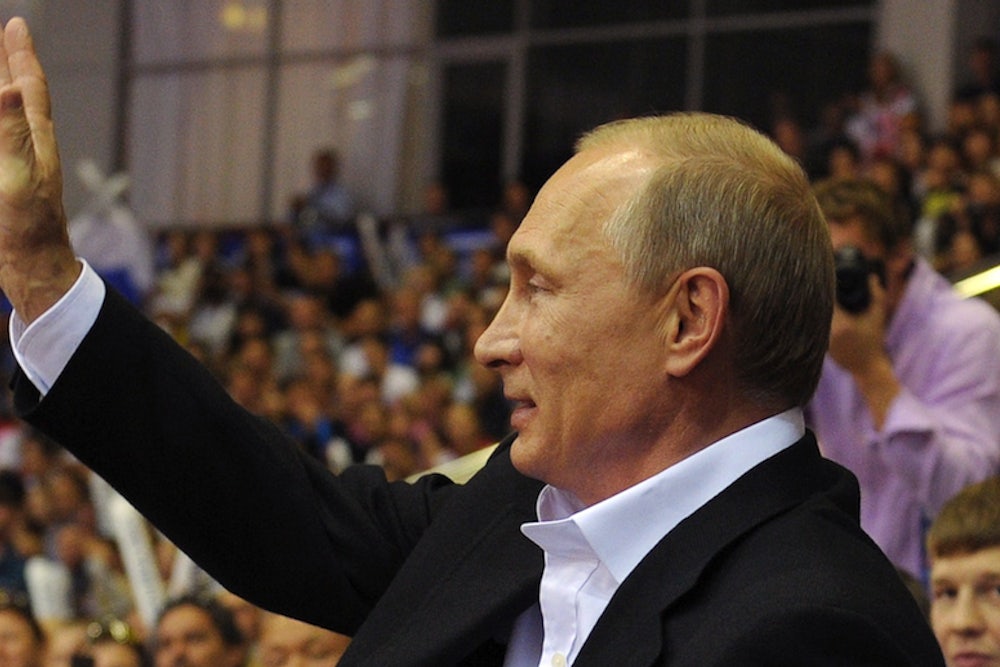Thanks to western sanctions and the Kremlin’s bans on foreign imports, Russia’s economic prospects look gloomy. In September, inflation reached a three-year peak, and could exceed 8 percent by the end of the year. Sliding crude oil prices, growth stagnation, capital flight, and the recent devaluation of Russia's sovereign debt to the second-lowest investment-grade rating leave little room for optimism. The current climate will ultimately increase social instability—indeed, it is already showing signs of doing so. And despite the arrogant speech Russian President Vladimir Putin delivered at the Valdai Discussion Club, an invite-only gathering of prominent journalists and policymakers held in Sochi last week, he has real reasons to worry.
It’s trivial to point out that Russia, ranking 127 out of 177 countries in Transparency International Corruption Perception Index, is an extremely corrupt country (in fact, TI estimates likely understate the reality). Putin’s kleptocratic system, brilliantly described by Karen Dawisha in a new book (which Cambridge University Press refused to publish earlier this year), has redistributed hydrocarbon profits in exchange to both the so-called core elites (people from the closest pro-Putin circles) and mass constituencies (through pay increases for public sector employees who constitute about 70% of Russia’s middle class, ISRAS estimates) in exchange for unquestioned loyalty. As various kleptocratic schemes evolved under Putin’s rule in the last decade, Russia has fallen about 50 places on the CPI index.
Putin’s main problem is that the system he built up is almost entirely based on material reimbursement. Personalistic regimes like the one he has built sustain the loyalty of their supporters almost entirely through access to material rewards, and they are extremely vulnerable to economic catastrophe. Unlike other political systems, neopatrimonial states have no alternative methods of ensuring support. In institutionalized autocratic systems like China, loyalty can be exchanged for partial power-sharing; in ideological systems like the USSR, moral commitment to ideological values and ideals may sustain elite loyalty. But in a political system built on corruption, the redistribution of capital is the primary method of getting and keeping political support.
For most of the previous decade, the Kremlin enjoyed a continuously expanding economy and increasing resource inflows; Putin had no problem buying the loyalty of the elites while maintaining the support of the Russian populace. So long as the economy was soaring, average Russians remained loyal to the authorities. But things started to change as early as 2011, when Boris Nemtsov, a Russian opposition leader, remarked, “Everyone is unhappy with Putin, save perhaps his closest friends.”
With shrinking financial resources, Putin is no longer able to satisfy both his base and the elites. Now there are signs Russia’s richest and most powerful citizens might be asking for more in exchange for their loyalty. Earlier this year, Putin announced that $14 billion would be allocated to fund three infrastructure projects, two of them by Russian Railways (owned by Vladimir Yakunin, another “longtime friend” of Putin’s). In May, Putin supported the Bank Rossiya, allegedly owned by Putin’s own Ozero Cooperative. After the bank suffered from the western sanctions earlier this year, Putin immediately granted the Bank the right to service payments on Russia's $36 billion wholesale electricity market, a huge business, worth 2 percent of Russia’s GDP (hence ensuring the Bank with up to $112 million annually from commission charges alone). In the meantime, more close friends of Putin are seeking support.
Putin had to make a choice, and it’s no surprise that he chose the elites over the people. A good illustration is the so-called ‘Rotenberg law’ currently making its way through the State Duma. The bill was submitted to Duma in September, right after one of Putin’s “longtime friends,” Arkady Rotenberg, had four of his Italian villas (he owns at least five) seized as a result of EU sanctions. The bill seeks to provide financial compensation from the state budget to Russian companies and citizens hit by western sanctions. The Rotenberg law illustrates exactly how Putin prioritizes keeping Russia’s wealthiest content, at the expense of average citizens: amidst a gradually worsening economic situation the pension funds of elderly Russians were appropriated to fill in the budget holes to prop up Putin’s old friends. Likewise, in the current 2015 budget draft which unrealistically assumes oil trades at $96 a barrel for 2015, the salaries of public sector employees will be indexed below the inflation level.
Some observers may argue that Putin’s actions of padding his closest circle’s pockets is nothing new. After all, that’s what the Russian government did after the 2008 crisis, when it also bailed out state-supported banks for $230 billion. But back then the economic situation was markedly different. Now, the Kremlin is hustling to maintain the loyalty of its only remaining support group. The predatory behavior of kleptocratic elites, and their complete dependence on the continued financial inflow from corrupt acquisitions, is why they have been known to abandon leaders as soon as their resources are endangered with such speed. Take Viktor Yanukovych, the former president of Ukraine, who was ousted immediately after the EU and the U.S. threatened to freeze the foreign assets of Ukrainian elites. The same crisis is now reverberating within Russia.
